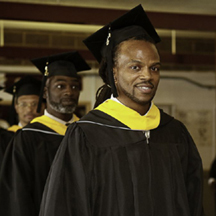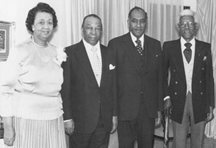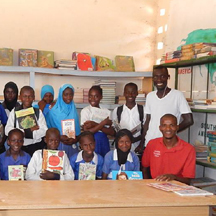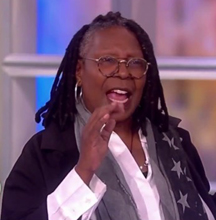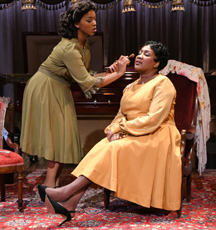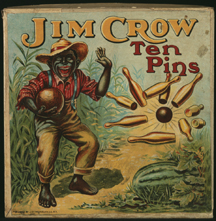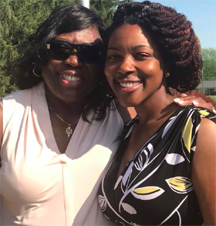
"If you could only see how some students acted before we started, it would amaze you. Education has made all of us better problem solvers," Troy says.
The opening of school is revealing more signs that America is open to teaching how to become more inclusive.
You have made me believe that together we can reach our dream goals," said Alhasan Bah, co–founder of the Balal Public Library in Soma, The Gambia.
Whites are the only ethnic group split in their approval/disapproval of the current president of the United States.
Unlike Nigerian President Muhammadu Buhari who, when visiting the U.S., did not question the U.S. President about whether he referred to African nations as ####hole countries, the South Africans are saying . . .
Besides the feel–good music, I ate up every word spoken during the 100–minute, no intermission play. Diane Mohr is the ticket winner. See article for new ticket drawing.
See what is most popular in Port Of Harlem's e-mailed issue, and on our web, Pinterest, and Facebook pages.
A Rand Corporation study funded by the Department of Justice found that incarcerated individuals like Troy who participate in correctional education are 43 percent less likely to return to prison within three years than prisoners who do not participate in any correctional program. "Giving people who have made mistakes in their lives a chance to get back on track and become contributing members of society is fundamental to who we are – – it can also be a cost saver for tax payers," said former US Secretary of Education Arne Duncan.
The Second Chance Pell pilot program began in July 2015. It is an Obama Administration initiative to test whether participation in high quality education programs increases after expanding access to financial aid for incarcerated individuals. The Department of Education lists 67 colleges and universities as participates in the new Second Chance Pell pilot program including UB and Anne Arundel (Maryland) Community College (AACC).
Eric is also seeking a second chance. He's 49–years–old and has been residing in JCI for 17 years. Eric was one of the first prisoners to sign up for the AACC two–year certificate program, but was apprehensive about taking the English Placement exam. "I have never been good at anything in school, certainly not a test," he confesses.
Several weeks passed before he learned that he had passed and scored with honors and was ecstatic upon hearing the news. "I remember how the news that I scored honors inspired me to go out and find the money to pay for the schooling. I was determined not to let a little thing like money stop me from pursuing my education," Eric recalls.
Both men, who are housed in a special unit of about 50 college students, intend to continue their education once released. Troy says he enjoys studying so much that, "I will either finish this degree or transfer credits to another degree." Eric strongly believes education is rewarding. "After wasting all this time just to realize education is my true path and purpose, I never want to stop learning," he says.
Does education help prison life, which is overwhelming and depressing? Troy believes education opens people's minds to deeper thought. "If you could only see how some students acted before we started, it would amaze you. Education has made all of us better problem solvers," he says.
The Department of Education lists 67 colleges and universities as participates in the new Second Chance Pell pilot program including University of Baltimore and Anne Arundel (Maryland) Community College (AACC).
For Eric, higher education inspires him and drives him to perform his very best. "My example sets the bar high and makes people coming behind me shoot for the stars and discover their true self–worth," he added.
Zaeed Zakaria, a 74–years–old who resided in Africa before coming to America, completed the business management program and now mentors others. "Mentorship is a noble mission," he states in his thick North African accent. "A good mentor seeks to help mentees optimize themselves and their education experiences, to assist their socialization into a disciplinary culture, and to aid them in finding suitable employment." However, he says, "Society is the ultimate winner because it will be safer with educated, humble, and positive new members."
AACC professor Tom agrees with Zakaria. "We hope that our Business Management and Entrepreneurship programs prepare our students for success and self–sufficiency upon their release (from prison)," says Tom.
Robert L. Moore, an alumnus of the AACC program, now has a bachelor's degree. He plans to use his degree to start a tech company. Moore concluded, "I really feel a sense of triumph and enrichment that I will take with me once I am released."
Note: Some surnames were not used as requested. Also see PBS' First Degree.
In Northern Virginia, J.E.B. Stuart High School reopened with a new name: Justice. Stuart was a White supremacist.
The school board that approved the new name described it as a compromise name that collectively honored Thurgood Marshall, Barbara Rose Johns, and Louis Gonzaga Mendez, Jr., among others who worked towards justice.
Far away from progressive Maryland and Northern Virginia into much more conservative Missouri, the North Kansas City school district opened two new elementary schools with fully gender neutral bathrooms. A few renovated restrooms in North Kansas City High School are also now gender neutral.
The bathrooms in America's heartland still have an open alcove area with a common trough sink, but the toilets are enclosed inside individual stalls with floor–to–ceiling walls and lockable doors. A single sign on the wall outside the bathrooms display both the male and female symbols. "You just don't know what gender a kid might identify as. This helps everyone to feel comfortable, accepted," parent Melanie Austin told the Kansas City Star newspaper.
Rustin and King
Rustin's relationship with King became cool in the early 1960s after Harlem Representative Adam Clayton Powell threatened to publicly accuse Rustin and King of having a sexual relationship. When Rustin began to organize the March on Washington, Senator Strom Thurmond rose on the floor of the U.S. Senate and attacked Rustin as a triple threat: draft dodger, homosexual, and communist.
Nevertheless, Rustin became the chief architect of the 1963 March on Washington, where King delivered his "I Have a Dream" speech. He spoke to the crowd after being introduced by Ossie Davis.
Naegle said naming a school for Rustin is appropriate. He said Rustin's fight for civil rights was a struggle for human rights. "It wasn't just about African–Americans. It wasn't just about gay people. It wasn't just about any particular group. He really worked to improve the lot of everybody."
America, the Diverse
Montgomery County actually mirrors America's future and seems to include everybody and spiked with income inequality. Though it has the 17th–highest median household income in the US ($99,763), about 35 percent of its public school students qualify for free and reduced–priced meals; of those, 83 percent of students qualify for completely free meals.
About 30 percent of the students are White, 29 percent are Hispanic, 21 percent Black, 14 percent are Asian, and nearly 5 percent are bi– or multi–racial. There are 158 countries and 127 languages within the student population.
Similarly, North Kansas City students speak 110 different languages and 20 percent of its students are of African descent. At Justice, the student population is 50.3% Hispanic, 23.4% White, 13.6% Asian, 10.1% Black, 2.4% bi– or multi–racial, and 0.2% American Indian/Alaska Native.
More changes are expected to come. The Montgomery County school system, the largest in Maryland, closes schools on major Christian and Jewish holidays and recently started closing for the Islamic holiday Eid al–Adha. Asian students are now asking that the Lunar New Year also become a day off.
Note: To Learn More about Rustin, see the POV film Brother Outsider
From Our Archives: Bayard Rustin's 100th Birthday Celebration March 17, 1912–August 24, 1987
TIME video: 12-Year-Old Transgender Oklahoma Student Speaks Out About Being Bullied by Parents
– sent 465 (valued at about $7,000 ) new, age appropriate, donated, mostly children's books for Balal and two other small libraries
– sent funds for small infrastructure improvements at two of the three libraries
– sending 214 gently used, donated textbooks (valued at $4,782) to a school of nearly 5,000 students with no books
For our second effort, Jonsaba Jaiteh reports that she is fine in her new apartment POHGEP is funding and is studying for her exams.
Two to the three groups we work with began selling the donated items we sent via barrels. They use the income to help fund their other projects and to gain some business skills.
Lastly, The Baobab Youth Development Association is buying exercise books, book packs, uniforms, shoes, and paying book rental, school, and lunch fees for the 18 students POHGEP supports.
The impact we are having, with your support, is long term and immediate says Jaiteh. "Having basic shelter allows me to finish high school, so that I may have a chance to support myself and my daughter and continue to show women that we can break the culture of silence and win!," she said
However, we are still short $1,090 – – with a September 1, 2018 deadline just two days away. We are thankful to the 16 people who have contributed to date. Interestingly, 77 percent of our donors have been women, but all people are encouraged to join us in connecting with our friends on Africa's smiling coast, The Gambia.
We Need to Reach The Goal by September 1, 2018:
TOTAL Goal: $3,370 | We Raised: $2,280 | We Need: $1,090
Derrick Johnson, NAACP President and CEO, said, "Our analysis shows President Trump's racism is a major factor in both why and how people will vote in the midterm elections. The poll confirms how Trump's racism has not only divided the nation and polluted policy, but also serves as a key factor in motivating voters of color to disrupt politics as usual on a national scale.
In response to South Africa's plans to redistribute more land from White to Black citizens, there have been "rumors" that White genocide was also taking place. Such rumors prompted the current president of the United States to tweet, "I have asked Secretary of State @SecPompeo to closely study the South Africa land and farm seizures and expropriations and the large scale killing of farmers. 'South African Government is now seizing land from White farmers.'"
Unlike Nigerian President Muhammadu Buhari who, when visiting the U.S., did not question the U.S. President about whether he referred to African nations as ####hole countries, the South African government tweeted, "South Africa totally rejects this narrow perception which only seeks to divide our nation and reminds us of our colonial past." It added that "South Africa will speed up the pace of land reform in a careful and inclusive manner that does not divide our nation."
President Cecil Ramaphosa also wrote an editorial in the Financial Times clarifying the policy and explaining why it's important for South Africa. He ends the editorial stating, "Land reform in South Africa is a moral, social, and economic imperative."
Nkosi Zwelivelile Mandla Mandela, a member of the Pan African Parliament and Nelson Mandala's grandson, was less diplomatic. He said the US President's tweet, "demonstrates a total ignorance of reality." As a pan–Africanist, he added that the US president would "be better served by dealing with his own domestic challenges and the fundamental issues that the 'Black Lives Matter' campaign raises."
Economic Freedom Fighters (EFF) leader Julius Malema was even less diplomatic, referring to the current US president as a "pathological liar.'' He said, "South Africa is a post–colonial country with deep racial inequalities that were long designed by apartheid and colonization. Our land expropriation programe seeks to realize the ideal of equality and human dignity." Besides being a leader of the political party EEF, Malema is a Member of Parliament. He previously served as President of the African National Congress Youth League and was a member of the ANC until his expulsion from the party in April 2012.
See also: What's Happening With HR40 / Commission on Slavery and the University of Virginia
White and Ayana Reed perfectly headline "Maria and Rosetta," now at Mosaic Theater at the Atlas Performing Arts Center through Sunday, September 30. And while the duo were absolutely great vocalists, Barbara Roy Gaskins actually plucked White's guitar and Ronnette F. Harmon twinkled Reed's piano during the production in Washington. Director Sandra L. Holloway, also a Black woman, did a great job making the allusion believable and entertaining as was set designer Andrew R. Cohen with creating the initially spooky, turned homey set – – partial spoiler alert: the set is a funeral parlor showroom.
As the vinyl spins on my turntable, I recall joining the packed audience laughing and clapping along with the musical performances that tells the story of the 1940s queens." She really has the stage movements," quipped theater–goer Larry Ferguson about White. After she belted, "This Train," it was clearly apparent that Mosaic Theater had being taken to church.
In many ways Sister Tharpe was the converse of Mahalia Jackson. In the play, Tharpe would often teasingly refer to Jackson as "Saint" Mahalia.
This was a play my 89–year–old mom would have adored. So, I asked her the following morning which singer she prefers. First she revealed that the more somber "Precious Lord Take My Hand," is the song she attached to Mahalia. The much more vibrant "Strange Things Happening Every Day," is the song she attached to "Sister Tharpe." Being the forever inclusive person, she said she likes them both. However, "I like Mahalia the best," she concluded.
Port Of Harlem subscriber Diane Mohr entered the drawing in Port Of Harlem's last issue and won a pair of tickets to see "Marie and Rosetta." I am sure she and any gospel and blues and history lover will have a great time at the show.
Note: MetroStage will start their final season after 30 years at 1201 N. Royal in Alexandria, VA. with the playwright that launched them in 1987, South African Athol Fugard. He is best known for his political plays opposing the system of apartheid and for the 2005 Academy Award–winning film of his novel "Tsotsi." (MetroStage will later move around the corner to become the cultural anchor of a new development.)
MetroStage will produce his most recent play "The Painted Rocks at Revolver Creek." Outsider artist Nukain Mabusa inspired the play that takes place during and in post–apartheid South Africa.
To join Mohr in the winners' circle and see "The Pained Rock at Revolver Creek," click here to enter the give–a–away.
Marie and Rosetta
Mosaic Theater @ Atlas Performing Arts Theater
1333 H Street, NE
Valet Parking at 1360 H Street, NE
Now through Sun, Sep 30, $20–$68
The Rocks Painted at Revolver Creek
MetroStage
1201 North Royal Street
Alexandria
Thu, Aug 30–Sun, Sep 30, $55
Enter drawing for free tickets
Story Time for Little Historians
“The Spider Weaver: A Legend of Kente Cloth”
Alexandria Black History Museum
Watson Reading Room
902 Wythe Street
Sat, Sep 1, 11a, $3 suggested
Ziggy Marley | Steel Pulse with Tribal Seeds and Iya Terra
Wolf Trap
1551 Trap Rd
Vienna, VA
Sat, Sep 1,6:30p–11p, $45–$60
African-American Collective Theater
Kennedy Center's -Page to Stage Festival
Terrace Gallery
Unprotected Sex by Alan Sharp
Sat, Sep 1, 7:30p-9:30p, free
Safe Streets Arts Foundation
Kennedy Center's -Page to Stage Festival
Family Theater
From Prison to the Stage: Music Art and Writing from Prisons Across America,
Sat, Sep 1, 8:30p-9:15p, free
Hope's 6th Annual Backpack Giveaway BBQ
Montebello Park
2040 E 32nd St
Sat, Sep 1, 1p–4p, free
New York
Black Citizenship in the Age of Jim Crow
New-York Historical Society
170 Central Park West
through Sun, Mar 3, 2019, $
Songs In The Key Of Art: Black Musicians by Jimmy James Greene
Calabar Imports
708 Franklin Avenue, between Park and Prospect Place
Brooklyn, NY
Now through Mon, Sep 24, free
Gambian harmonies, with Salieu Suso and Rashiim Saho
Bunna Cafe
1084 Flushing Avenue
Brooklyn, NY
Wed, Sep 5, 8p–10p, free
“An American Odyssey:
The Life and Work of Romare Bearden”
Book signing with Spellman College President
Mary Schmidt Campbell
NYU Law School
D'Agostino Hall, Room: Lipton Hall
108 West 3rd Street
Wed, Sep 12, 6p, free
Nairobi, Kenya
Intense exercise with Girl talk team: Zumba, hot yoga, meditation
MashPark Hotel
Off Ngong' Road
Nairobi, Nairobi County
Sun, Sep 2, 10a–12p,free
The World
Celebration of Life and Aretha's Franklin's Funeral
Bounce TV
Fri, Aug 31, 9a-2:30p

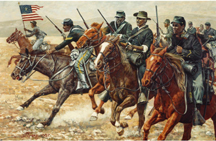
Black, Brave, & Bold
Part 2 – African American Congressional
Medal of Honor Winners
– The Indian Wars & The Interim Period





